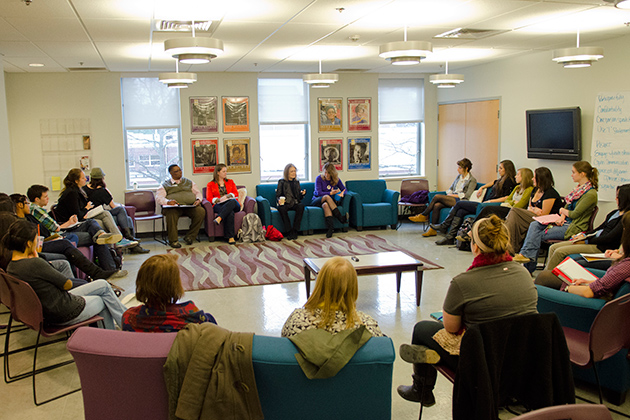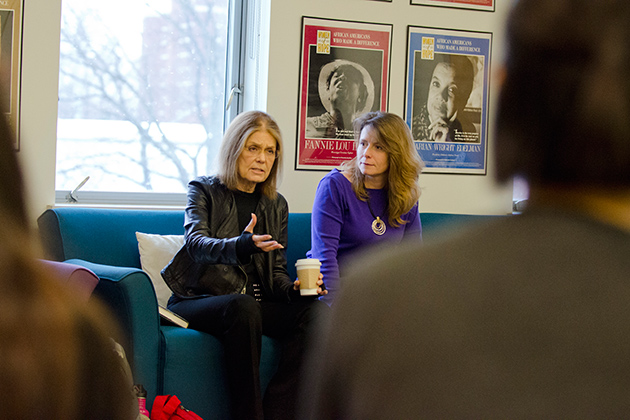
Gloria Steinem, co-founder of Ms. Magazine and one of the most prominent leaders of the women’s movement, answered questions and provided living history lessons to a group of students actively involved with the Women’s Center, as part of the Center’s 40th anniversary program on Friday.
Sitting among a circle of about 20 students in the Center’s program room, Steinem spent more than an hour discussing issues ranging from politics and the Vietnam War to economic parity and sexuality, before delivering remarks to a capacity audience in the Student Union Theatre.

Answering a question about the development of activism for women’s rights, Steinem said the women’s movement resulted from the treatment of women who were part of the civil rights and anti-war protests of the 1960s. She said male participants in the protests treated women “just the way corporations did,” often limiting their role to making copies of protest fliers and serving coffee.
“That really was the birth of the understanding that there needed to be an autonomous women’s movement,” Steinem said, noting that Betty Friedan’s landmark book The Feminine Mystique (1963) had addressed college-educated women sitting in the suburbs realizing there must be something more to life. “More came out of the civil rights and anti-war movements.”
One student asked about her experience protesting against the Vietnam conflict, something that today’s young people read about in history books, and noted that the same kind of protests do not occur now.
Steinem said today’s anti-war efforts are actually more effective, because one of the main issues in the Vietnam protests was the drafting of Americans to serve in the military as part of the war effort.

“It was not as good as it is now, [when] we turned against two wars in half the time, in terms of the national feelings against Iraq and Afghanistan,” she said. “I do think we may romanticize that time in the past. It was actually all about the draft … When the draft disappeared a lot of the anti-war feeling went. It was exhilarating and it was brave, but I would say it was more limited than similar kinds of movements we see now.”
In a discussion about economic disparity between men and women, Steinem said equal pay for women could be “the biggest, most effective economic stimulus this country could possibly have,” pumping $200 billion into the national economy.
“Those women are going to spend the money,” she said. “They’re not going to send it to Switzerland or invest it in China. They’re going to spend it, and it’s going to create jobs.”
Using the example of parking lot attendants – who are men – making more money than childcare givers – who are women, Steinem said that after equal pay, there needs to be a value placed on “all productive human work.”
“Right now a third of the work that is caregiving, whether it’s raising children, taking care of relatives or invalids, [takes place in the home]” she said. “The country could not go on without it. It has no economic value. You could attribute that replacement level and economic value … and make that tax deductible. Whether it’s men or women, it’s in the national interest because usually care given in the home is better and less expensive than institutionalized care.”

Turning to politics, Steinem noted that often when she speaks on a university campus, she will be asked why some groups are against lesbians and birth control.
“Those groups really believe that human sexuality is only moral and OK if it’s directed toward having children and inside patriarchal marriage, so the children are properly owned,” she said. “They object to any de-linkage of sexual expression from reproduction. That is contrary to human nature. Sexuality has always been a way we expressed caring, love, closeness, and pleasure, not only a way we have children. Women have always known how to control their own fertility and whether and when to have children.”
She said that social movements continue to be spoken of as isolated entities, “still spoken of as in silos, as if they are separate, without enough explanation of the connections.” She said this was apparent during the 2008 Presidential election, when Sens. Hillary Clinton and Barack Obama were competing in the Democratic primary and the news media portrayed the candidates as representing separate constituencies.
“It had to be you were putting sex over race, or race over sex,” she said. “It was profoundly destructive.”
[yframe url=’http://www.youtube.com/watch?v=wMQNNDYCmN4′]



